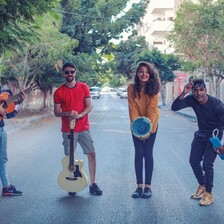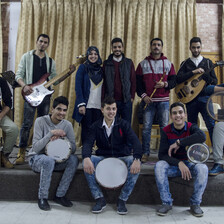The Electronic Intifada Gaza City 14 July 2016

The Watar Band peform in Gaza City in February 2016.
APA imagesIt’s taken a long time and demanded patience and perseverance. But slowly, and in spite of all the obstacles, Gaza’s Watar Band is gaining international recognition.
The soft rock pop group recently completed a tour of France, organized by the French Institute of Jerusalem, a branch of France’s official international cultural center, marking their second such trip in a four-year period that also saw them win a prestigious arts award and record their first album.
“Our friendship and ambition helped us face all difficulties,” said Khamis Abushaban, 26, the band’s bassist.
Abushaban is one of four friends who founded the now seven-strong band in 2008. That year also witnessed the devastation of the 2008-2009 Israeli attack that left more than 1,400 people dead in Gaza.
The horror left an indelible mark.
Concert in Gaza’s rubble
“In 2009, just after the 2008-2009 aggression, we had our first concert,” said Abushaban.
“We performed in the rubble of the Palestine Red Crescent Society building, which was destroyed during the assault. The building had been home to the only music school in Gaza.”
The concert was hugely symbolic for the band, and repeated Israeli aggressions have all left their mark on its members.
During Israel’s 51 days of bombing in the summer of 2014, the band recorded and released the track “We Teach Life, Sir.”
“In one of the short ceasefires, we gathered in the house of a friend who had a home studio and recorded our song. The lyrics are written by Rafeef Ziadah [a Palestinian spoken word artist and activist], and inspired us to compose the music around it.”
The tempo of the melody line played on a piano responds to Ziadah’s spoken word poetry describing the problematic way the media spins Israel’s violence against Palestinians. The Watar Band’s voices come in with the chorus, singing in English before an electric guitar solo and a shift to a rap in Arabic about dreaming in Gaza despite the deadly bombs.
The video, showing scenes from Gaza both tragic and joyful, was widely shared and marked the band out. Abushaban attributed the video’s success to “deep lyrics,” a “strong melody” and the fact that it came out while war was raging.
Four years later, Watar Band performed at the International University Music Festival in France, making them the first band resident in Gaza to perform outside the coastal enclave since the siege of Gaza was imposed in 2007.
They did so with what Abushaban called the “unlimited” help of the French Institute of Gaza.
First album
“For years, the French Institute of Gaza helped us without limit. They facilitated our travel to France in 2012, where we performed in front of more than 10,000 people. We played in Paris and Belfort. We sang in Arabic, English and French,” Abushaban said. “That trip inspired us to keep on working for more opportunities outside Gaza.”
In 2013, they released their first self-penned song “Dawsha” (noise). The single was surprise success at home, in spite of its Western pop song style.
The song is a response to the protests that broke out across the Arab world the previous two years. A hopeful melody line performed on classic guitar is accompanied by piano and drums as Alaa Shoublaq sings in Arabic about Arab youths’ aspirations for freedom.
In 2014, the band won the Qattan Fund for Performing Arts, an award established by the A.M. Qattan Foundation to encourage talented young performers. The funding allowed the band to record their first album, Stranger in Here, an eight-song CD production that includes “Dawsha.”
Last March, the French Institute of Jerusalem then launched a project called “Gaza Unreleased” which aimed at showing a side of Gaza the world never sees. Artists, researchers and academics from Gaza, Watar Band among them, were given the opportunity to visit France for five days, and to hold exhibitions, join conferences and give concerts in Paris and Marseille.
Long journey
With freedom of movement to and from Gaza cut off by Egypt and Israel for years, traveling to France was no small feat.
“Getting to France was very difficult,” said Eyad Abulila, 25, the band’s drummer and a teacher at the Edward Said National Conservatory of Music.
“We had to have permits to enter Israel through the Erez crossing. It was very complicated to get permits to enter Jordan, from where we took our flight to Paris. In fact, when we reached France on 18 March, we had to go straight to our first concert at the Arab World Institute in Paris.”
Exhausted from a 24-hour trip, the band took to the stage in Paris to face a barrage of questions by audience members curious about life in Gaza. And the energy began to return to the band.
“During the concert, we were completely shocked by their positive reactions. They sang, danced and clapped with us,” Abulila said.
A second concert in Marseille, coordinated by a local boycott, divestment and sanctions campaign group, followed on 21 March, in front of a what Abulila called a “very active” audience, before the band went to Stains, in the country’s north, for their final concert in France.
“Our concert in Stains was the best,” said Abulila. “We were very close to the audience. And although they didn’t understand the lyrics, they reacted so well to our music.”
If 24 hours exhausted the band getting to France, the return trip would prove even more onerous at 48 hours. But the trip ultimately invigorated the band.
“We are full of positive energy and drive to make more music,” Abulila said. “We want to show the world the real face of Gaza.”
Mousa Tawfiq is a Palestinian journalist and musician based in Gaza City.





